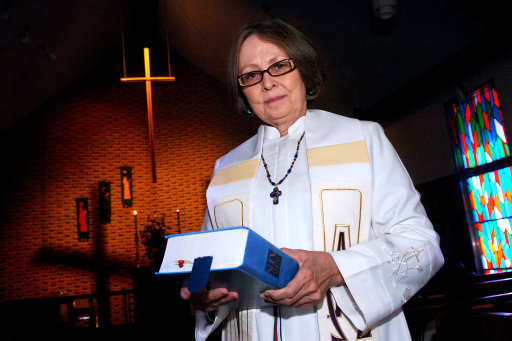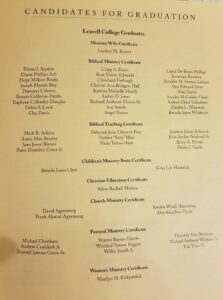Two weeks ago, I had the joy of graduating from the New Orleans Baptist Theological Seminary (NOBTS) with a Master’s of Divinity in Christian Apologetics. Studying there for the last eight years has been a blessing. During my time at NOBTS, I have learned a great deal about understanding, teaching, and defending the Christian faith. The school’s faculty has taught each of my courses in accordance with the Baptist Faith and Message 2000 (BFM 2000) and each one of my instructors and professors has exhibited a genuine faith and a love for the Lord and His people. Additionally, my tuition was affordable and a variety of class offerings made earning a degree through a distance learning program feasible. Sitting in the chapel on December 16, 2017 with my fellow graduates was a very happy occasion indeed. Unfortunately, it was marred by my school’s implicit denial of (biblical) Southern Baptist doctrine in the form of one of the graduates in the Church Leadership Certificate Program.
At face value, the Church Leadership Certificate Program is great. According to the school’s website, the program “was founded to respond to the needs of church by preparing believers to serve more effectively in their church and their community.” Certificates are offered in Biblical Ministry, Biblical Teaching, Church Music, Church Ministry, Pastoral Ministry, Preschool and Children’s Ministry, Advanced Preschool and Children’s Ministry, Ministry Wives, Christian Education, Church Planting, Women’s Ministry, Advanced Women’s Ministry, and Pastoral Ministry in African American Church Studies. I would personally recommend that those serving in various ministry capacities obtain this type of training if getting a full degree is not convenient or affordable for them. My own wife has taken several courses in the “Ministry Wives” program, from which I believe she benefited. Unfortunately, the Leadership Certificate Program has not exhibited biblical fidelity in the area of Pastoral Ministry.
During this month’s ceremony, I witnessed a female graduate from the Pastoral Ministry Program. This came as a shock to me given that women are not biblically eligible to hold the pastoral office. Article VI of the BFM 2000, entitled “The Church,” states:
“A New Testament church of the Lord Jesus Christ is an autonomous local congregation of baptized believers, associated by covenant in the faith and fellowship of the gospel; observing the two ordinances of Christ, governed by His laws, exercising the gifts, rights, and privileges invested in them by His Word, and seeking to extend the gospel to the ends of the earth. Each congregation operates under the Lordship of Christ through democratic processes. In such a congregation each member is responsible and accountable to Christ as Lord. Its scriptural officers are pastors and deacons. While both men and women are gifted for service in the church, the office of pastor is limited to men as qualified by Scripture.
The New Testament speaks also of the church as the Body of Christ which includes all of the redeemed of all the ages, believers from every tribe, and tongue, and people, and nation.”
Although the Southern Baptist Convention’s official statement of faith denies that women are eligible to fill the pastoral office, its own seminary has granted a woman a certificate of leadership in “Pastoral Ministry.” At NOBTS, teachers are required to teach according to the BFM 2000. In fact, students are surveyed at the end of each course in order to ensure that their teachers have done so. How is it that a woman was allowed to earn leadership certificates in Pastoral Ministry? There is of course no requirement for students at NOBTS to be Southern Baptist, or even Baptist, to enroll. It is understandable, in academic setting, that there will be a diversity of theological views even among evangelical students. There is certainly nothing wrong with a Southern Baptist Seminary granting an earned degree to a Methodist or Presbyterian student in subjects such as Counseling or Biblical Languages. However, it is downright unethical for a Southern Baptist Seminary to certify a woman as fit for “pastoral ministry” no matter what her denomination. What is the message in doing so? “We don’t believe you are fit to be a pastor but here is a certificate in pastoral ministry.” These women don’t need to be encouraged but corrected. How does certifying unequivocally unqualified “pastors” fulfill the great commission? To make matters worse, almost 100% of the graduates of the various certificate programs were people of color. The American black community, as a whole, has suffered from a dearth of male leadership since the imposition of LBJ’s “Great Society.” According to Hoover Institute economist Thomas Sowell:
“Nearly a hundred years of the supposed “legacy of slavery” found most black children being raised in two-parent families in 1960. But thirty years after the liberal welfare state found the great majority of black children being raised by a single parent.”
Lack of available male leadership has spread from the black home to the (culturally) black church. This reality might tempt some to justify the training of black women who are willing to pick up the slack and serve as pastors. However, to embrace pragmatism at the expense of forsaking biblical doctrine is to say to God, “I know better than you.” The BFM 2000 is clear (as is the Bible): women are not to be pastors. Training them to be such, to the point of granting them a leadership certificate makes no sense. It is the acceptance of plain and simple liberalism. Southern Baptists did not fight the battles of the Conservative Resurgence so that its seminaries could train women for the pastorate. NOBTS needs to stop this practice immediately. There are a variety of opportunities and roles for women to train for in the church. Pastor is not one of them.
*Please note that the preceding is my personal opinion. It is not necessarily the opinion of any entity by which I am employed, any church at which I am a member, any church which I attend, or the educational institution at which I am enrolled. Any copyrighted material displayed or referenced is done under the doctrine of fair use.












